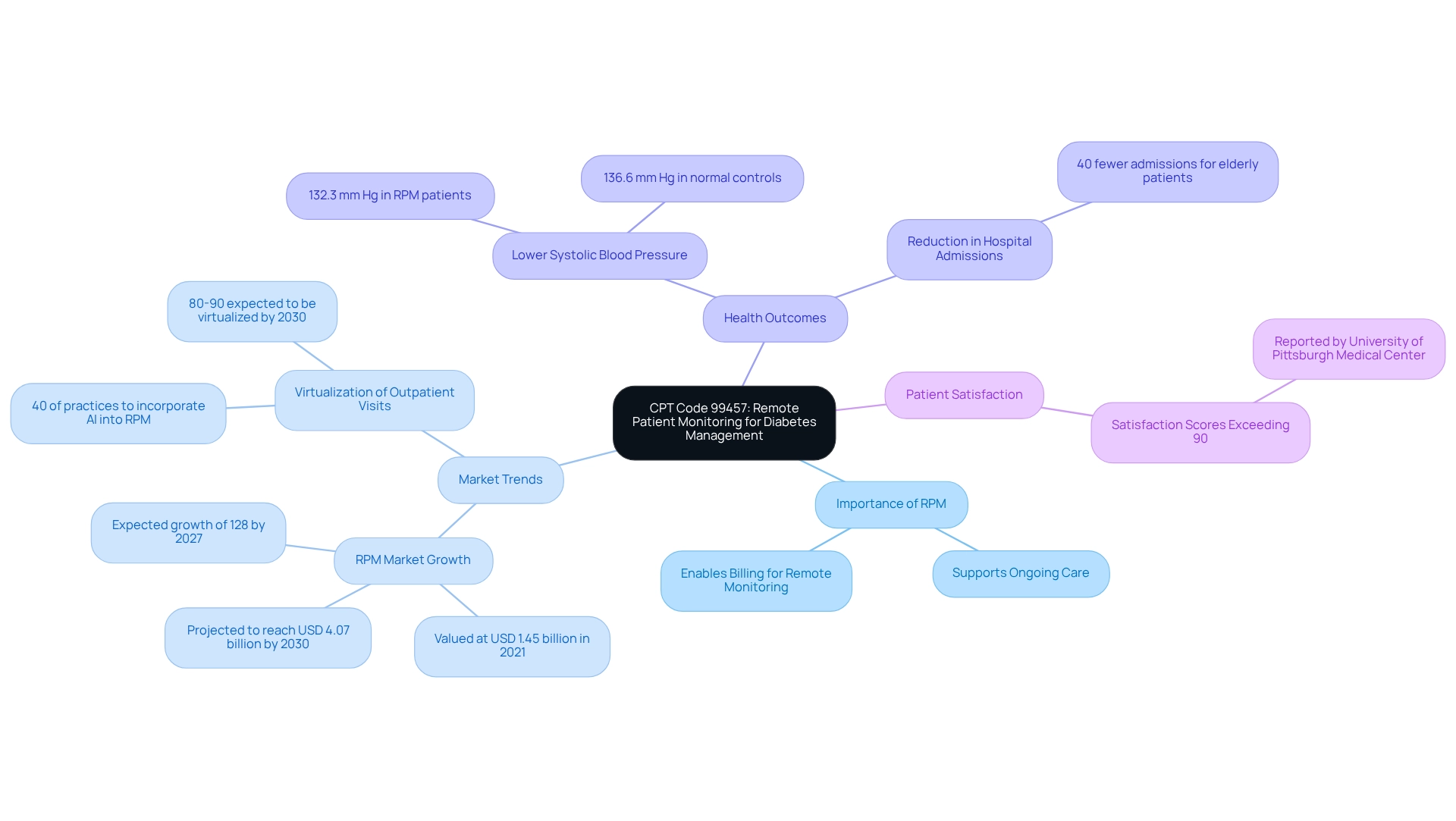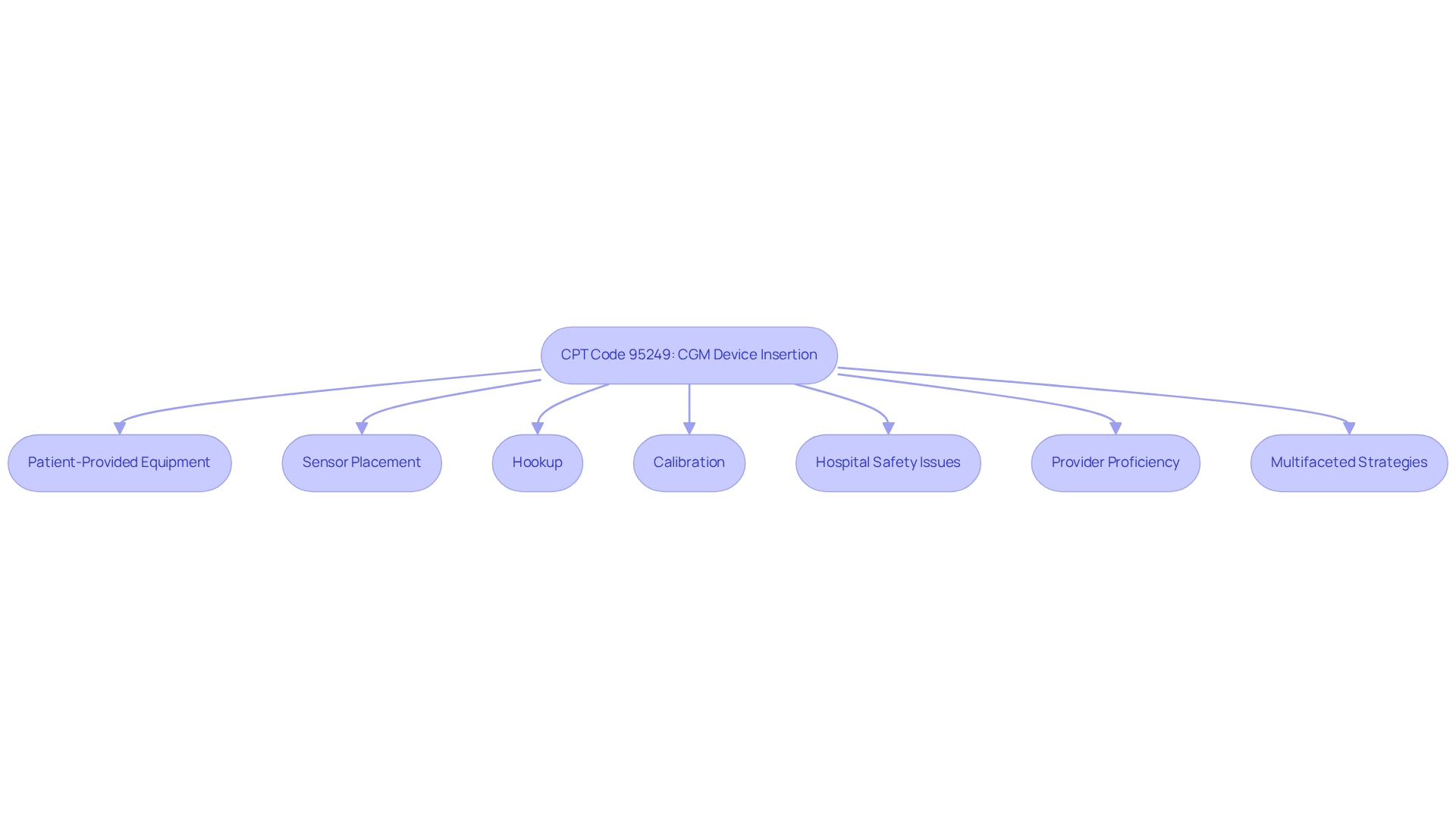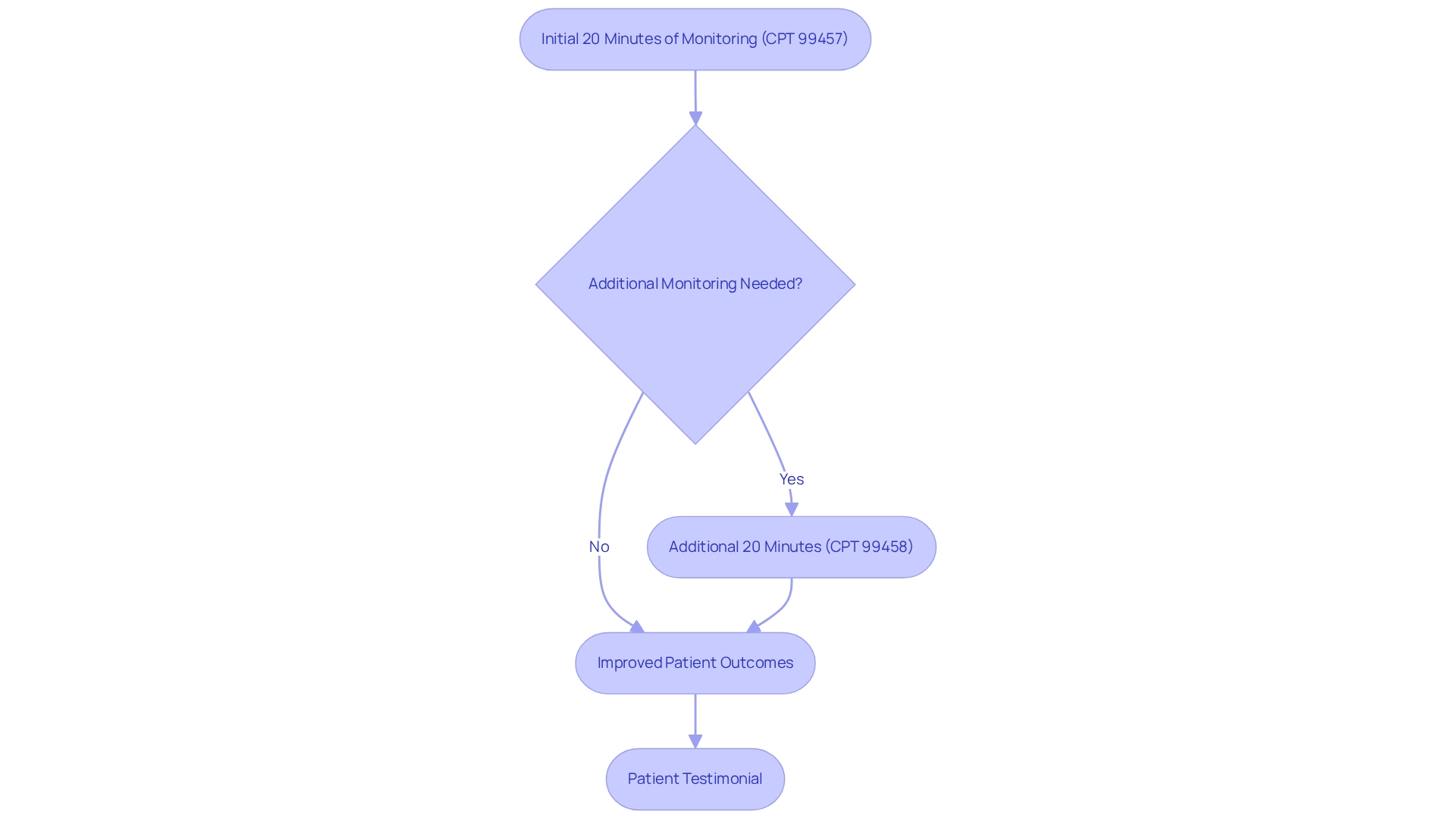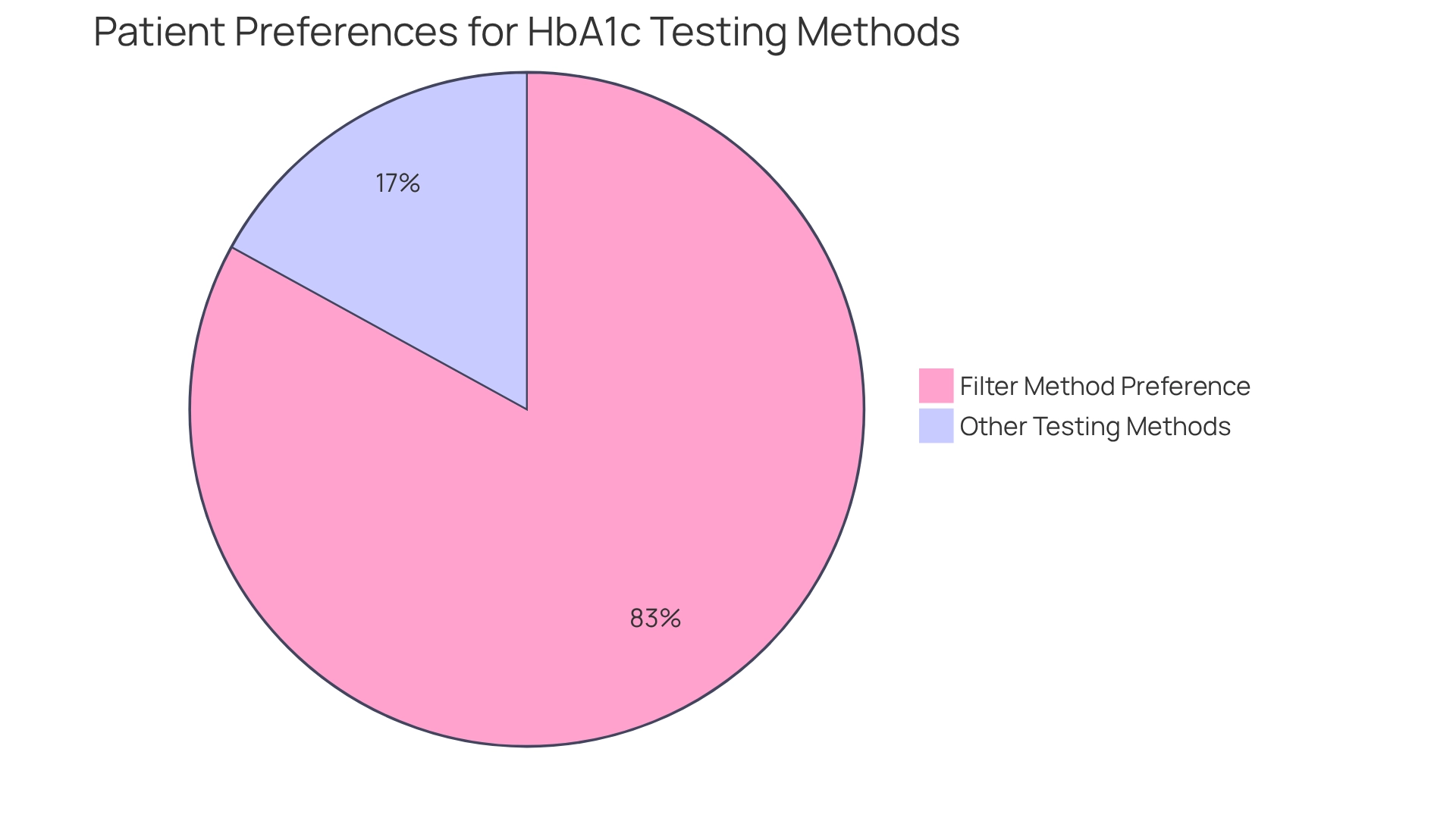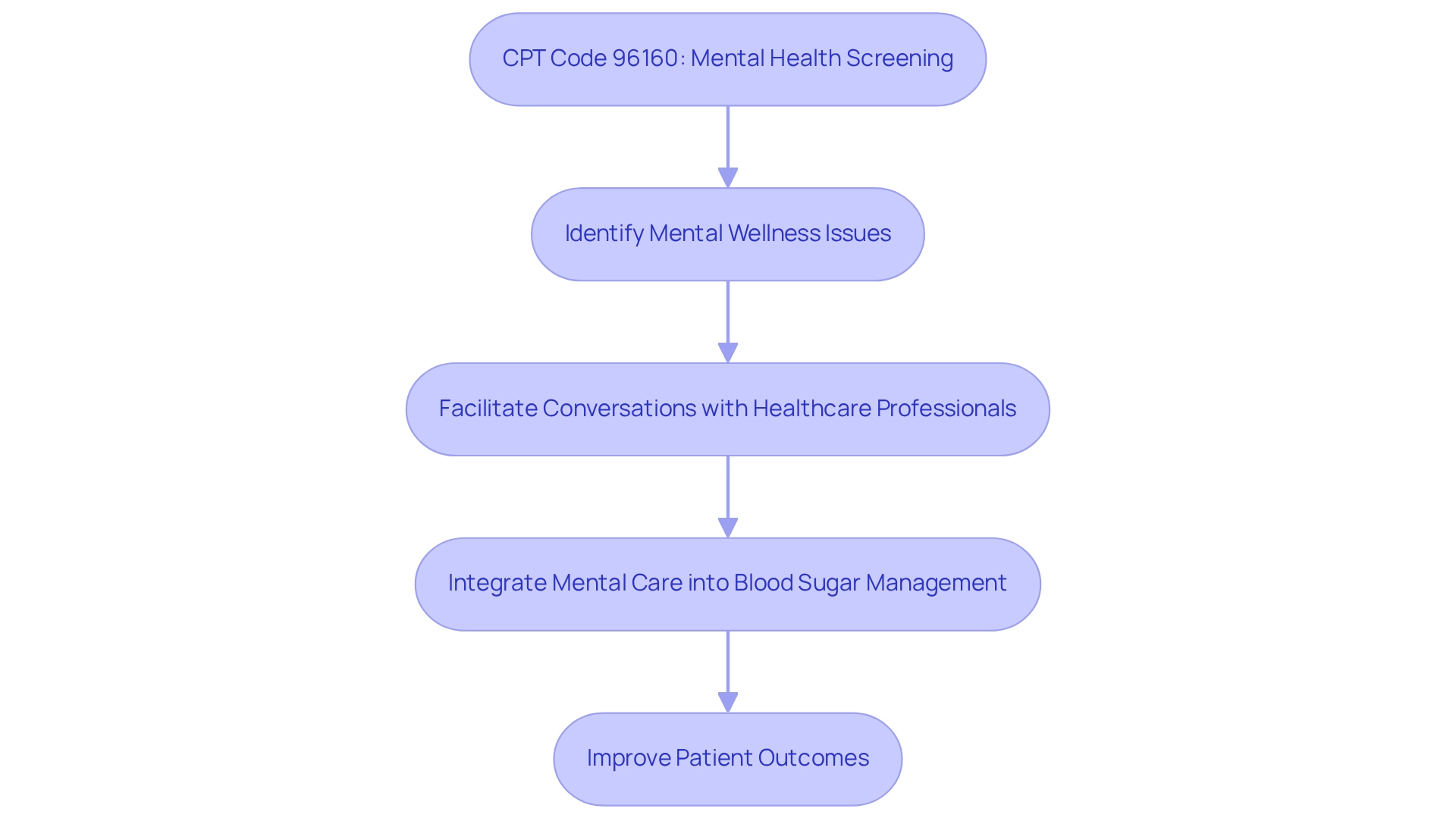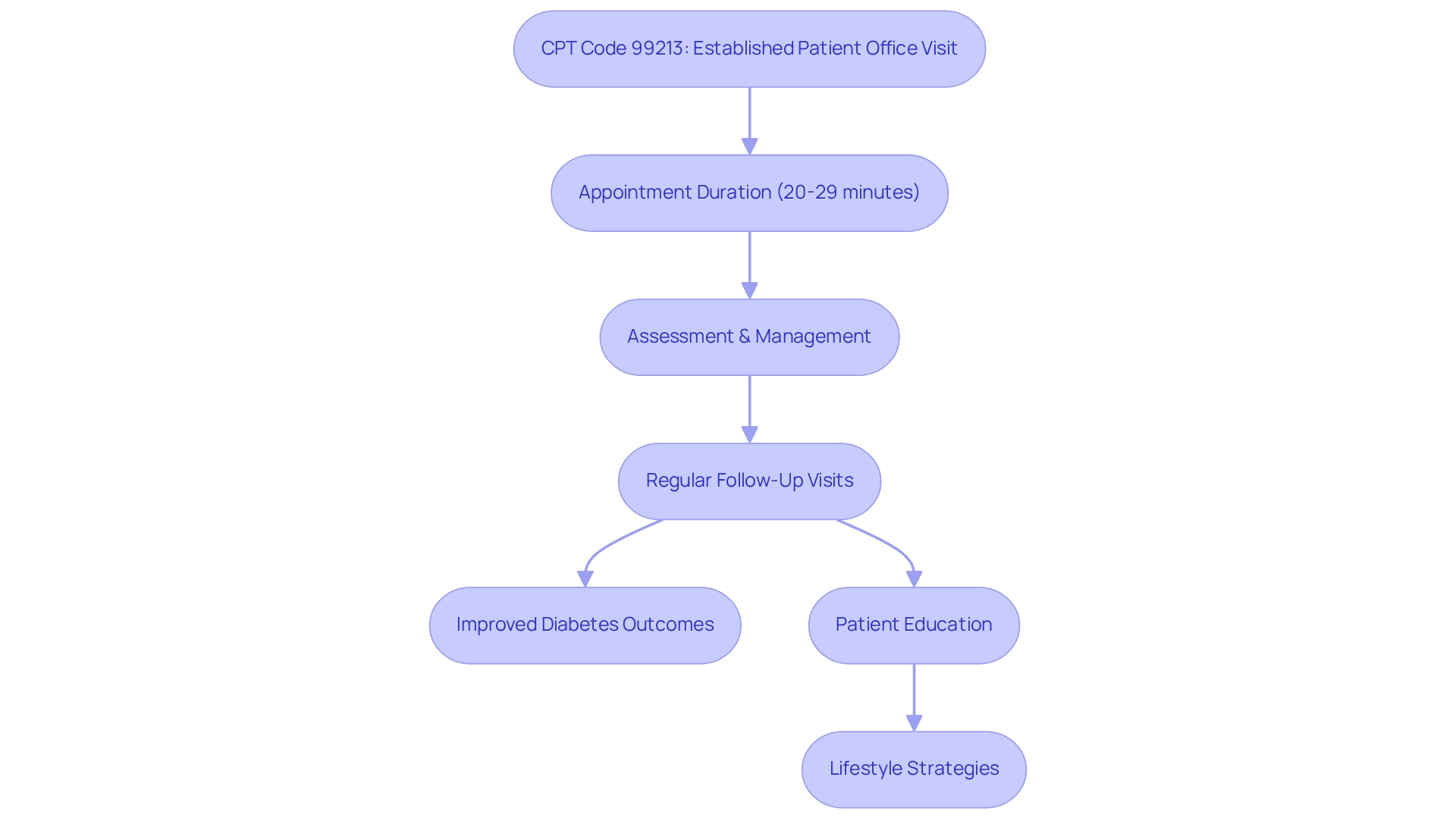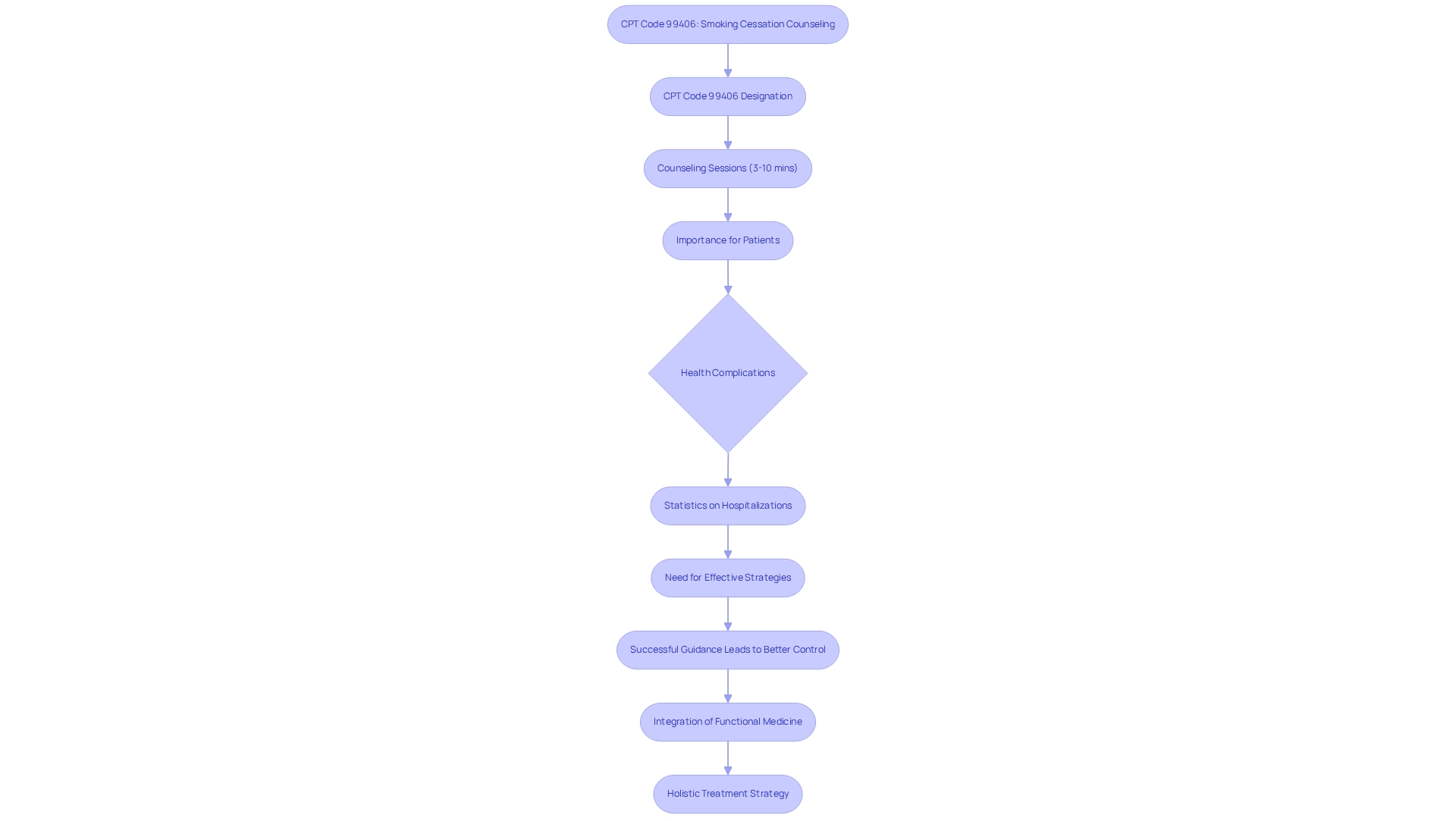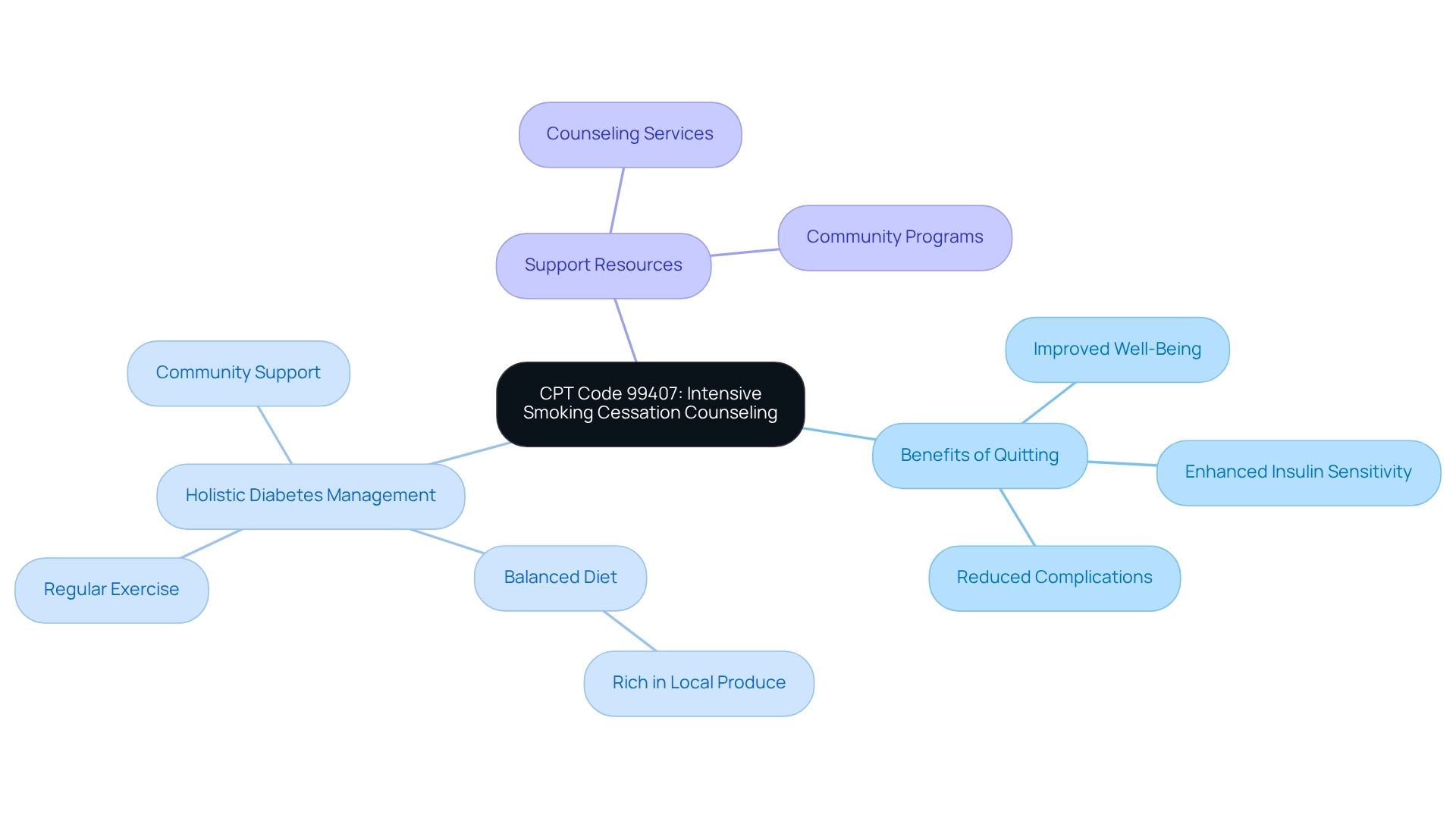Overview
The main focus of this article is to highlight essential CPT codes related to diabetes management and their crucial role in delivering effective healthcare. It’s important to recognize that understanding these codes can significantly impact patient care. For instance, codes like 95250 for continuous glucose monitoring and 99457 for remote patient monitoring are vital. Many patients find that these codes not only facilitate better outcomes but also enable healthcare providers to offer tailored care. This ensures that patients receive the attention they deserve while also allowing for appropriate billing for the services rendered. By embracing these codes, we can foster a more supportive environment for those managing diabetes.
Introduction
In the battle against type 2 diabetes, it’s important to recognize that a comprehensive and empowering approach is essential for effective management and potential reversal of the condition. The 30-Day Diabetes Reset Program, led by Dr. Jason Shumard, offers a unique opportunity for participants to transform their health through:
- Personalized coaching
- Nutritional guidance
- A wealth of educational resources
Many patients find that this initiative not only addresses the immediate symptoms of diabetes but also delves into its root causes, fostering a holistic understanding of health. With a track record of success stories and proven strategies, this program exemplifies a shift towards integrative wellness, where patients are equipped with the tools and knowledge to take control of their well-being. As research increasingly supports the need for personalized care in diabetes management, this program stands out as a beacon of hope for those seeking lasting change.
Integrative Wellness Center: 30-Day Diabetes Reset Program
The 30-Day Diabetes Reset Program, which incorporates the diabetes cpt code, is a transformative initiative designed to empower individuals with the essential tools and knowledge to manage and potentially reverse type 2 diabetes. Led by Dr. Jason Shumard, this program provides personalized coaching, nutritional guidance, and a wealth of educational resources. Participants are encouraged to gain a deeper understanding of their condition and make informed lifestyle changes. It’s important to recognize that by emphasizing integrative wellness, the program not only targets the symptoms of diabetes but also addresses its underlying causes, promoting a comprehensive approach to well-being.
Dr. Shumard brings nearly 20 years of experience and advanced education in functional endocrinology and clinical nutrition. He has successfully assisted thousands in regaining their health. His commitment to safe, effective, and lasting solutions is reflected in the success stories of those who have participated in the 30-Day Diabetes Reset Program. Many patients report significant improvements, including weight loss, enhanced energy levels, and reduced reliance on medications.
Consider the journey of one patient who shared, “I lost 55 lbs. My A1C started at 9.1 after 8 months it is now 5.7. My regular MD has cut my blood pressure meds in half and will start reducing my other prescriptions in the near future.” Another patient expressed, “I feel so much better and going through the cleanse helped in so many ways. I lost a lot of weight, have more energy and feel great. I am not depressed anymore and I don’t need my meds anymore!”
Recent research, including the GlycoLeap study, suggests that individuals in health control programs like the 30-Day Diabetes Reset Program have achieved notable results, with some indicating an average weight reduction of 2.5%. This weight reduction is essential for enhancing insulin sensitivity and overall well-being. Moreover, the program’s focus on individual education and empowerment aligns with the latest research advocating for personalized care strategies in diabetes management, which includes understanding the diabetes cpt code.
Dr. Jason Shumard highlights the significance of this approach, stating, “By offering individuals actionable insights and practical tools, the center cultivates an atmosphere where people can regain their wellness and well-being.” This dedication to integrative wellness, through practices such as customized nutritional plans and continuous support, not only improves individual outcomes but also fosters a supportive community where people feel empowered to take charge of their health journey.
To learn more about the 30-Day Diabetes Reset Program and how it can help you, contact Integrative Wellness Center at 858-564-7081 or register now to reserve your spot!
CPT Code 95250: Professional Continuous Glucose Monitoring Services
The diabetes CPT code 95250 encompasses professional continuous glucose monitoring (CGM) services, including the setup, calibration, and education on the effective use of CGM devices. This service is essential for individuals grappling with blood sugar issues, as it offers real-time glucose information that aids in better handling of their condition. Many patients find that incorporating CGM into their blood sugar management significantly improves their outcomes.
Research suggests that regular monitoring can lead to better glycemic control and fewer complications, and it’s important to recognize that the diabetes CPT code ensures healthcare providers receive reimbursement for the time and resources dedicated to monitoring individuals efficiently. Notably, compensation for CGM services during a hospital stay is included within the inpatient DRG or case-rate payment to the facility. This highlights the financial aspect of the diabetes CPT code 95250 and its significance in blood sugar control.
As the field of glucose regulation care progresses, the importance of the diabetes CPT code 95250 becomes increasingly evident, especially with advancements in CGM technology that offer more precise and user-friendly devices. For instance, Adam Brown points out that the Pro CGM system is easier for providers to establish, requires no fingersticks, and is more affordable and scalable than other professional CGMs. This not only improves compliance but also enhances satisfaction for individuals.
Furthermore, the DICE project emphasizes the necessity of fully staffed inpatient teams for those facing blood sugar challenges, underscoring the importance of comprehensive strategies that incorporate CGM services. This connection highlights how the diabetes CPT code 95250 supports such initiatives. Addressing hospital safety concerns, such as the high rates of incorrect medications and infections, is vital for improving diabetes management outcomes. Precise observation via CGM can help reduce risks associated with these safety issues, ensuring individuals receive the best possible care.
Providers are encouraged to confirm coverage with individual payers for CGM services, ensuring that individuals can access these vital tools without financial barriers. Overall, the diabetes CPT code 95250 plays a crucial role in empowering individuals and enhancing outcomes in blood sugar management, particularly when combined with effective education strategies, as illustrated in the case study on Education and Empowerment.
CPT Code 99457: Remote Patient Monitoring for Diabetes Management
CPT Code 99457, known as the diabetes cpt code, is essential for remote individual monitoring services designed specifically for diabetes management. This code enables healthcare providers to bill for at least 20 minutes of interactive communication with individuals regarding their remotely collected health data. Such services are crucial for delivering ongoing care, particularly for those who may struggle to attend in-person appointments. Jason Shumard, owner of Integrative Wellness Center, emphasizes the importance of personalized functional medicine strategies in managing type 2 diabetes. His approach not only focuses on remote monitoring but also incorporates customized nutrition and comprehensive health solutions that empower individuals to take control of their well-being.
It’s important to recognize that recent trends indicate a significant shift toward remote monitoring in chronic illness care. By 2027, the RPM systems market is expected to grow by 128%, reflecting our increasing reliance on technology to enhance healthcare. Moreover, projections suggest that by 2030, 80-90% of outpatient visits will be virtualized, with many practices integrating artificial intelligence into their RPM solutions.
Many patients find that the benefits of RPM for diabetes care are substantial. For instance, those utilizing RPM have shown lower systolic blood pressure, averaging 132.3 mm Hg compared to 136.6 mm Hg in normal controls. This improvement underscores the effectiveness of regular monitoring and engagement in managing chronic conditions. Significantly, statistics reveal that RPM initiatives have led to a 40% reduction in hospital admissions for older adults, further highlighting the positive impact of these technologies.
Additionally, a case study indicates that the RPM devices market, valued at USD 1.45 billion in 2021, is projected to reach USD 4.07 billion by 2030, driven by the rising prevalence of chronic illnesses that require ongoing management. This growth emphasizes the importance of the diabetes CPT code in facilitating effective care for individuals managing their conditions. The influence of CPT Code 99457 extends beyond billing; it enhances engagement in care. Healthcare providers have reported increased satisfaction among individuals, with the University of Pittsburgh Medical Center noting that their satisfaction scores exceeded 90% after implementing RPM solutions. This involvement fosters a proactive approach to health care, empowering individuals to manage their conditions through tailored guidance and support from specialists like Dr. Shumard. In summary, the diabetes cpt code 99457 not only assists in reimbursement for remote monitoring services but also plays a vital role in improving health outcomes for individuals with chronic conditions through enhanced engagement and ongoing support. This aligns seamlessly with Dr. Shumard’s comprehensive health solutions, encouraging a healthier and more empowered approach to diabetes management.
CPT Code 95249: Continuous Glucose Monitoring Device Insertion
CPT Code 95249 plays a vital role in the insertion of continuous glucose monitoring (CGM) devices. This code encompasses everything from the patient-provided equipment to sensor placement, as well as the crucial hookup and calibration of the monitor. It’s important to recognize that precise billing for this service not only reflects the healthcare provider’s commitment to advanced technology but also supports effective health oversight.
The significance of CGM in managing blood sugar conditions cannot be overstated, especially when considering alarming hospital safety issues, such as the 7,000 incorrect medications administered and the 80,000 infections contracted in medical facilities. These statistics highlight the essential need for accurate control of blood sugar levels to mitigate risks associated with hospital care. Many patients find that healthcare providers who manage a larger number of individuals using CGM demonstrate greater proficiency in its application, leading to improved overall outcomes. This expertise translates into better condition management, as patients gain access to more accurate and timely data regarding their glucose levels.
Furthermore, a recent survey involving 87 respondents shed light on both facilitators and barriers to CGM provision. This emphasizes the need for a multifaceted approach to increase CGM uptake among eligible individuals. Dr. Jason Shumard aptly pointed out, “Addressing these external factors will necessitate a multifaceted strategy by policymakers, health systems, and manufacturers to ensure an equitable prescribing environment to enhance CGM uptake in all eligible individuals with the condition.”
Case studies, such as those utilizing the Consolidated Framework for Implementation Research (CFIR), have identified key factors affecting CGM adoption among healthcare providers. By understanding these influences, healthcare providers can better assist their clients in effectively utilizing CGM technology, ultimately improving care delivery for patients with blood sugar issues.
Expert opinions reinforce the importance of the diabetes CPT code 95249, as it not only facilitates the insertion of CGM devices but also plays a crucial role in the broader context of diabetes management. The center’s educational materials aim to be accessible and beneficial for everyone, equipping them with the knowledge necessary to manage their conditions effectively. As technology adoption trends continue to evolve, integrating CGM into routine care is becoming increasingly vital for empowering individuals and enhancing their quality of life.
CPT Code 99458: Additional Remote Patient Monitoring Services
CPT Code 99458 serves as a vital add-on code, enabling healthcare providers to bill for every additional 20 minutes spent on remote monitoring after the first 20 minutes covered by CPT Code 99457. This provision is particularly important for managing complex diabetes cases, as it facilitates more personalized and attentive care tailored to individual needs, using the appropriate diabetes CPT code.
Since the introduction of remote monitoring services for individuals on January 1, 2022, there has been a significant increase in engagement and health outcomes. Many patients find that using these services leads to improved glycemic control and a reduction in hospital admissions. By utilizing the diabetes CPT code 99458, providers can ensure they are fairly compensated for the time dedicated to these essential interactions, ultimately fostering a more supportive environment for individuals managing diabetes.
Consider the example of hypertension management, where a provider applies CPT Code 99458 alongside CPT Code 99457 following an initial consultation. This illustrates how the code can be effectively used in real-world scenarios, enhancing understanding for patients.
The holistic approach embraced by practitioners like Dr. Jason Shumard at Integrative Wellness Center, who focuses on education and empowerment, aligns perfectly with the objectives of extended remote monitoring. Individuals participating in comprehensive programs, such as Dr. Shumard’s 30-Day Diabetes Reset Program, often share transformative experiences that underscore the importance of ongoing support and guidance in their wellness journeys related to diabetes CPT code. One patient expressed, “I lost 55 lbs. My A1C started at 9.1 after 8 months it is now 5.7. My regular MD has cut my blood pressure meds in half and will start reducing my other prescriptions in the near future.” Dr. Shumard emphasizes, “By offering patients actionable insights and practical tools, the center cultivates an environment where individuals can reclaim their wellness and well-being.” Integrating the diabetes CPT code into glucose management not only enhances the quality of patient-provider interactions but also contributes to improved overall health outcomes.
For more information on how Dr. Shumard can assist you in effectively managing your condition, reach out to the Integrative Wellness Center today!
CPT Code 83036: Hemoglobin A1c Testing
CPT Code 83036 plays a crucial role in billing hemoglobin A1c tests, which measure average blood glucose levels over the past two to three months. This important assessment serves as a foundation for blood sugar regulation, offering essential insights into an individual’s long-term glucose control. It’s important to recognize that regular A1c testing is vital; it empowers healthcare providers to make informed adjustments to treatment strategies, ultimately enhancing outcomes for individuals.
Many patients find that effective testing methods are key in managing chronic diseases. In fact, statistics reveal that 83% of participants prefer the filter method for HbA1c sampling, highlighting the significance of these approaches. Understanding the typical uses of the diabetes CPT code enables healthcare providers to accurately bill for related care services, ensuring that individuals receive the necessary treatment.
The latest guidelines stress the importance of routine A1c testing, as it profoundly influences treatment modifications and overall outcomes in diabetes management, which are documented under the diabetes CPT code. By prioritizing regular A1c evaluations, individuals can take charge of their wellness journeys, leading to an improved quality of life. As Dr. Jason Shumard wisely states, “By offering individuals actionable insights and practical tools, the center fosters an environment where people can reclaim their well-being and vitality.” This compassionate approach not only empowers patients but also addresses the risks associated with traditional treatments for diabetes, underscoring the value of personalized functional medicine in reversing type 2 diabetes.
CPT Code 96160: Screening for Diabetes-Related Mental Health Issues
CPT Code 96160 is specifically designed to administer patient-focused wellness risk assessments, particularly for screening diabetes-related mental well-being issues. It’s crucial to acknowledge that individuals with blood sugar challenges often face elevated rates of mental disorders, such as depression and anxiety. Research indicates that a significant number of these individuals encounter mental wellness issues, underlining the essential need for psychological support within treatment strategies.
The implementation of mental wellness screenings, enabled by the diabetes CPT code, plays a vital role in enhancing diabetes management. Many patients find that regular screening not only helps identify mental wellness concerns but also encourages open conversations with healthcare professionals. For instance, a study titled ‘Facilitating Conversations about Mental Well-Being in Diabetes Care’ revealed that patients felt more comfortable discussing their mental health when screening measures were in place. This suggests that such practices can significantly improve the overall quality of care, as highlighted by a systematic review published in the Journal of Psychosomatic Research, which examines the bidirectional relationship between diabetes and anxiety.
Moreover, the importance of the diabetes CPT code 96160 extends beyond merely recognizing mental wellness issues; it actively fosters the integration of mental care into blood sugar management. By ensuring individuals receive appropriate mental health evaluations, healthcare professionals can tailor interventions that address both the physical and psychological aspects of the condition. This holistic approach is crucial for enhancing patient outcomes and improving quality of life.
Incorporating stress reduction techniques, such as mindfulness, yoga, and relaxation exercises, further enriches care for those managing blood sugar issues. These practices not only alleviate stress but also support hormonal balance and overall well-being, contributing to better blood sugar control. Mindfulness enhances awareness of eating habits, yoga encourages physical activity, and relaxation exercises can reduce cortisol levels—all beneficial for managing blood sugar levels. Professional insights emphasize the necessity of psychological support in managing blood sugar conditions. Psychologists advocate for the implementation of the diabetes CPT code 96160 as a standard practice, highlighting its role in bridging physical wellness and mental well-being. As Dr. Niamh McGrath poignantly states, “The incorporation of mental wellness evaluations into blood sugar management is essential for meeting the overall requirements of individuals.” As the healthcare landscape evolves, integrating mental health screenings and stress management techniques into care for individuals with blood sugar challenges is increasingly recognized as a vital component of comprehensive treatment strategies.
CPT Code 99213: Established Patient Office Visit
CPT Code 99213 is designated for established client office visits that involve a moderate level of medical decision-making. Typically, these appointments last from 20 to 29 minutes, providing healthcare providers the opportunity to assess and manage ongoing health care effectively. Regular office visits are vital for monitoring patient progress, enabling timely adjustments to treatment plans tailored to individual needs.
It’s important to recognize that regular follow-up visits are significantly linked to improved management outcomes for diabetes, as indicated by the diabetes cpt code, including better control of HbA1c levels and reduced systolic blood pressure. A study conducted from March 2011 through December 2012 revealed a notable negative association between the frequency of visits and adverse health metrics, underscoring the essential role of regular check-ups in diabetes care, which often involves the diabetes cpt code.
Many healthcare providers emphasize the importance of CPT Code 99213, noting that these established visits foster ongoing conversations between individuals and their care teams. This continuous dialogue is crucial for addressing concerns, enhancing education, and motivating individuals to adhere to their treatment strategies. In San Marcos, CA, where community support is paramount, engaging with local wellness programs can further amplify the benefits of these visits, offering additional resources and encouragement for patients.
Incorporating lifestyle strategies, such as nutrition and exercise, is essential for effective diabetes management, which may involve the diabetes cpt code. Patients are encouraged to explore local farmers’ markets for fresh produce, which can be a delightful addition to a balanced diet. Participating in outdoor activities, like hiking or enjoying the scenic parks of San Marcos, not only enhances physical fitness but also uplifts mental well-being.
Many individuals find inspiration in their healthcare journeys, expressing a desire to serve as role models for others facing similar challenges. As one participant shared, “I just want to be an inspiration for someone who’s going through the same thing that I’m going through.” This personal connection not only fosters client involvement but also underscores the importance of regular appointments in achieving long-term wellness goals. Transformative experiences, such as those from Dr. Jason Shumard’s 30-Day Diabetes Reset program, illustrate how personalized guidance can lead to meaningful improvements in health, particularly relevant to the diabetes cpt code, empowering individuals to take charge of their condition.
Looking ahead to 2025, updates regarding the diabetes cpt code 99213 will further underscore its significance in the evolving landscape of diabetes management. These updates will reinforce the necessity of established client office visits as a foundational element of effective care, ensuring that individuals receive the most current and relevant support. By prioritizing these interactions, individuals can greatly enhance their wellness outcomes and overall quality of life.
CPT Code 99406: Smoking Cessation Counseling
CPT Code 99406 is designated for intermediate smoking and tobacco-use cessation counseling sessions that last between 3 to 10 minutes. This code is essential for healthcare providers, allowing them to charge for counseling services designed to help individuals quit smoking.
It’s important to recognize that for those struggling with this condition, the significance of this counseling cannot be overstated; smoking greatly worsens complications related to the diabetes CPT code and hinders overall well-being. Many patients find that research indicates diabetic individuals who smoke face heightened risks of severe health complications, including heart disease, kidney damage, and nerve damage.
In fact, statistics show that Canadians with diabetes were hospitalized up to 20 times more often for lower limb amputation compared to those without the condition. This highlights the urgent need for effective smoking cessation strategies. Successful smoking cessation guidance can lead to better control of blood sugar levels, as quitting smoking improves insulin sensitivity and lowers the likelihood of complications.
Additionally, integrating functional medicine approaches, such as personalized nutrition plans and stress management techniques, can further empower individuals on their diabetes management journey, which may also involve the diabetes CPT code. Statistics indicate that smoking cessation counseling is effective, with research demonstrating that individuals who participate in such programs are more likely to successfully quit smoking.
The application of the diabetes CPT code 99406 not only enhances access to these essential counseling services but also leads to improved outcomes for individuals with diabetes. As we look toward 2025, the persistent focus on smoking cessation guidance within blood sugar regulation continues to gain traction. This underscores the necessity for healthcare providers to utilize CPT Code 99406 effectively.
Expert insights emphasize that incorporating smoking cessation strategies into metabolic condition management can notably improve individual empowerment and health transformation. As Dr. Jason Shumard promotes holistic methods, Dr. Allison Barrie, MD, reminds us, “You may utilize the 99407 code for more than 10 minutes of smoking cessation counseling.” This further highlights the importance of thorough counseling in health care.
By addressing smoking as a crucial element in managing blood sugar conditions, healthcare providers can incorporate the diabetes CPT code to promote a more holistic and efficient treatment strategy for those they serve.
CPT Code 99407: Intensive Smoking Cessation Counseling
CPT Code 99407 plays a vital role in supporting individuals on their journey to quit smoking and tobacco use. This code is specifically for intensive counseling sessions lasting more than 10 minutes, allowing healthcare providers to offer comprehensive support that can significantly enhance a patient’s chances of success.
It’s important to recognize that giving up smoking is particularly beneficial for those managing type 2 conditions. Not only can it improve overall well-being, but it can also enhance insulin sensitivity and reduce the risk of complications.
Many patients find that integrating smoking cessation into a holistic approach to diabetes management, which may involve the diabetes CPT code, can lead to remarkable improvements in their health. This approach includes:
- A balanced diet rich in local produce
- Regular exercise
- The invaluable support of community resources
By embracing these changes, individuals can experience better health outcomes and a higher quality of life. Remember, you are not alone on this journey; support is available, and every step you take toward quitting smoking is a step toward a healthier future.
Conclusion
The 30-Day Diabetes Reset Program is not just a program; it’s a beacon of hope for those navigating the challenges of type 2 diabetes. With a compassionate approach, Dr. Jason Shumard provides personalized coaching and nutritional guidance, empowering participants to delve into the root causes of their condition. Imagine the relief of understanding your health better, as illustrated by the inspiring success stories of individuals who have embraced significant lifestyle changes, improved their health metrics, and reduced their reliance on medications.
It’s important to recognize that technology plays a pivotal role in this journey. The integration of continuous glucose monitoring and remote patient monitoring services, supported by relevant CPT codes, enhances diabetes management. These tools foster better communication between healthcare providers and patients, ensuring tailored care that meets individual needs. Many patients find that this holistic approach, which encompasses physical, nutritional, and mental health support, is essential for addressing the complexities of diabetes.
Ultimately, the 30-Day Diabetes Reset Program, alongside the innovative use of CPT codes for diabetes management, signifies a transformative shift towards integrative wellness. By equipping patients with the knowledge, tools, and support they need, this initiative empowers individuals to take control of their health journeys. As more people embrace these comprehensive strategies, the potential for reversing type 2 diabetes and achieving lasting wellness becomes increasingly attainable. For those seeking meaningful change, consider this program as the first step towards a healthier future. Together, we can navigate this path to wellness.
Frequently Asked Questions
What is the 30-Day Diabetes Reset Program?
The 30-Day Diabetes Reset Program is a transformative initiative designed to empower individuals with the tools and knowledge to manage and potentially reverse type 2 diabetes. It includes personalized coaching, nutritional guidance, and educational resources, emphasizing integrative wellness to address both symptoms and underlying causes of diabetes.
Who leads the 30-Day Diabetes Reset Program?
The program is led by Dr. Jason Shumard, who has nearly 20 years of experience in functional endocrinology and clinical nutrition.
What are some reported benefits of participating in the program?
Participants have reported significant improvements such as weight loss, enhanced energy levels, and reduced reliance on medications. Success stories include one patient losing 55 lbs and significantly improving their A1C levels.
How does the program support individual education and empowerment?
The program focuses on providing actionable insights and practical tools, including customized nutritional plans and continuous support, which help individuals regain their wellness and take charge of their health journey.
What is the diabetes CPT code 95250?
The diabetes CPT code 95250 encompasses professional continuous glucose monitoring (CGM) services, including setup, calibration, and education on effective CGM device use, which is essential for managing blood sugar issues.
Why is the diabetes CPT code 95250 important for healthcare providers?
This code ensures that healthcare providers receive reimbursement for the time and resources dedicated to monitoring individuals, which is crucial for effective diabetes management.
What advancements have been made in continuous glucose monitoring technology?
Newer CGM systems, like the Pro CGM system, are easier for providers to set up, require no fingersticks, and are more affordable, improving compliance and satisfaction for patients.
What is the significance of CPT Code 99457?
CPT Code 99457 is essential for remote individual monitoring services for diabetes management, allowing healthcare providers to bill for interactive communication about remotely collected health data.
How is remote patient monitoring (RPM) changing diabetes care?
There is a significant shift toward remote monitoring, with projections indicating that by 2030, a large percentage of outpatient visits will be virtualized. RPM has shown benefits like lower blood pressure and reduced hospital admissions for older adults.
How does the diabetes CPT code 99457 enhance patient engagement?
The code not only assists in reimbursement for remote monitoring services but also fosters increased patient satisfaction and engagement in their care, leading to better health outcomes.
